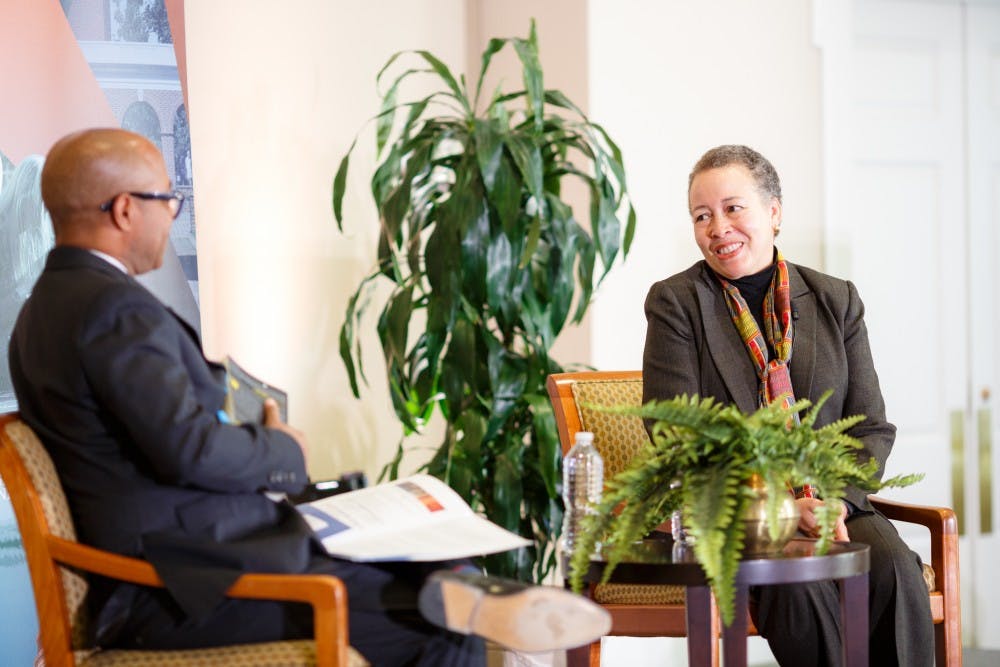Students, faculty and community members gathered in the Newcomb Ballroom Tuesday afternoon to hear author Beverly D. Tatum talk about racism, prejudice and activism in the context of her recently updated critically-acclaimed winning book, “Why Are All the Black Kids Sitting Together in the Cafeteria? And Other Conversations About Race”.
Tatum was chosen as the Curry School’s 2018 Walter N. Ridley Lecture Series Distinguished Speaker. The Walter N. Ridley Distinguished Speaker Series commemorates Walter Ridley, the first black person to graduate from the University, by facilitating constructive discussions about race and society.
Tatum, the president emerita of Spelman College, has a masters of arts and a doctorate of philosophy in clinical psychology.
Tatum began her lecture by discussing what motivated her to continue what she dubbed “the great tradition of talking about race.” She said much of inspiration for exploring the issue has stemmed from conversations she has had with students in her university classes.
“I had been teaching on the psychology of racism,” Tatum said. “[It was a] regular experience of my students [to say] why is it that we didn't have these conversations in high school … why was there so much silence about it.”
During her time as a college professor and lecturer, Tatum said she began to organize a series of workshops and lectures with fellow faculty members and students in an effort to address the lack of dialogue about race — a process which led to the title of her critically acclaimed book.
“[I] started doing workshops with teachers … on how to break that silence with their students,” Tatum said. ‘The teachers would always ask me … why are all the black kids sitting together in the cafeteria?”
Tatum said there is an important distinction to be drawn between prejudice and racism.
“Prejudice and racism are not the same thing,” Tatum said. “[I]t’s really important to be clear about how we are using our language.”
Tatum defined prejudice as “an attitude based on a limited amount of information” while she said racism is “a system of advantage based on race.”
Tatum added that prejudice, at its core, is universal and much more subtly expressed than racism.
“[Prejudice is] like smog in the air,” Tatum said. “[We are] exposed to misinformation about people similar … and different … from ourselves.”
Tatum also said that prejudice can affect anyone and be indirectly expressed while racism characterizes certain institutional advantages individuals may hold over others.
“Some of us are more exposed to smog than others,” Tatum said. “You can't breathe it and not have it affect your cellular structure in some way.”
When asked what prompted her to update her book in 2017, Tatum said that students born in recent decades hold fundamentally different world views than their predecessors. More specifically, Tatum identified the rise of social media, media portrayals of racialized police brutality, the election of former U.S. President Barack Obama and the “divisive rhetoric” of the 2016 election as contributing factors to these differing perceptions.
“Students … born in 1997 or 2000 have a different world view,” Tatum said.
Tatum said these events and developments, particularly the use of social media, have propagated activist movements like Black Lives Matter and increased national awareness of contemporary race relations.
Tatum added that social media has made racial activism more real for the larger population because it is “easier to spread information.”
“When you see cellphone video … of a police officer planting a gun on someone … it’s hard to deny that something was wrong,” Tatum said. “There are racial disparities … in terms of how people are treated.”
Tatum said this increase in awareness has had an overall positive impact upon the country but lamented the racist reactions it generated characterized by the “post election … resurgence of neo-Nazi [and] Klan action.”
Tatum also stressed the importance of engaging with others in addressing and confronting systemic inequality, particularly those who have different perspectives from your own.
“If you're going to be effective in the 21st century, you better know how to engage with people who are different from yourself,” Tatum said.
Joanna Williams, an associate professor in the Curry School, said that reading Tatum’s book should be a nation-wide requirement.
“[I was] struck by how Dr. Tatum found a way into the conversation for so many people who wanted to talk about [racism]... but didn’t know how.”







